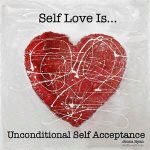Cultivating Self-Love is one of the foundations of self-esteem. The most important person to have a loving and caring relationship with is with you. Self-love is the basis of your happiness, as well as your physical and emotional health. Self-Love is vital toward developing and sustaining healthy relationships with others, or the ability to move on from an unhealthy relationship. If you struggle with loving yourself, you will likely struggle with loving relationships with others. Spiritual truth says: what you to do yourself you do to others.
There are both myths and truths about self-love.
3 common Myths about Self-Love:
1. I need to please others: In childhood I experienced and learned that in order to get love, acceptance and approval, “I needed to please others” and I still believe this today. In pleasing others, we tend to forget the self. Over time, this depletes you especially, emotionally, leading to resentment, unhappiness and overall life dissatisfaction. 
2. Self-Love is being selfish: Childhood taught me that to love the self, was being selfish, arrogant or egoistical. I became programmed to feel guilt or shame if I took care of and loved myself, if I said, “No” ‒ set boundaries for myself. We learned to love and value others unconditionally, yet, “conditions” apply to loving ourselves.
3. Life is 90% what happens to me and 10% what I do with it. This myth caused me to develop an unhealthy and unloving relationship with myself around a difficult circumstance. I become the victim (blaming/hating myself) or the villain (blaming/hating others) because of the circumstance.
Life circumstances can cause us to become sad, fearful, angry, bitter, and resentful. There is a part of us that ultimately needs to blame someone or something for our feelings and emotions. In the end, I either blame you or I blame myself. This blame is judgment, and judgment is simply the withholding of love. Within my difficult situation, I do not love you or I do not love myself. Either way, my wounded self is not being loving. It’s protecting/defending itself or condemning the self. This is fear, not love.
The truth is: life is 10% what happens to me and 90% what I do with it. This means I take responsibility for my thoughts, beliefs, choices and behaviors regarding the experience. This is a more loving, accepting and empowering way to move through life experiences.
6 Truths of Self-Love:
1. You instinctively know your true worth. Question: How easily do you give up your value and sense of worth when things go wrong? People, who love themselves, instinctively believe and know they are worthy and of value.
Within the struggles and hardships of life, they have accepted and learned that life offers a series of problems in the form of lessons, and their life experiences are the lessons. Within these experiences, working with and through their circumstances, they have developed a more positive, self-empowering and life enhancing relationship to their unfortunate circumstances.
They are not defined by the unfortunate experience, rather they see it as an opportunity to deeply love them self, have compassion for themselves and others within and because of the experience.
They choose out of love and a desire for higher learning and growth, not to diminish their self-worth and love of self. They realize the circumstance was a test of their faith and to not lose our self-love, within the difficult experience. They accept it’s not always possible to like yourself or the experience, but you should never give up loving yourself, because of the experience.
The truth is, loving the self is one of the most positive and healthy ways to live and cope with life. To love your self is to value yourself and know your worth. Self-love and worth, naturally spills over to loving and accepting others.
2. Return to the Source of Love: In my humanness I tend to forget I am love, innocence and goodness, due to difficult and painful experiences. I experience, rejection, abandonment, or betrayal, which leads me to feel embarrassment/shame or injustice i.e. the world is not fair. My perception and belief of separation takes shape in my reality.
There is however, another truth and reality beyond what I have made true. There is a source and power within me and all around me that is pure and unconditional love and acceptance. This love is the source and basis of all that exist.
To return to this source is to remember and return to love. It is to remember and return to that which I am‒Love. This ends the perception and belief in separation and returns me back to inclusion. 
Love, innocence and worthiness represent inclusion. Fear, shame and unworthiness imply exclusion. To have self-love is to include myself again.
3. Self-Love creates and builds resilience. Resilience embodies the qualities of flexibility, hardiness and determination. I love and care about myself enough, that I choose to see my circumstances through. So I am open and accepting to my circumstances. Moving away from avoidance, resistance, shame or blame.
To be flexible and adapting, offers me the motivation and determination to change what I can. The greater my self-love, the greater my resilience and willingness to change what I can. The greater my resilience the deeper my self-love.
4. Loving the self without the conditions. The unconditional love and acceptance you offer others, is to be offered and expressed to yourself first and foremost, without conditions or “yah buts.” The airplane ride proves this statement. When traveling by plane, with a small child, the flight attendant says: “Put the oxygen mask on yourself first before your child.” Why? Because, in order to keep your child safe and secure, you need to have yourself safe and secure first.
A fundamental way to feel safe and secure is through self-love. Don’t wait for others to affirm you, affirm yourself freely and daily. True happiness comes from the unconditional love and acceptance with all parts of us.
5. All of our experiences are meant to bring us back to love. A difficult spiritual concept to comprehend is the notion that our experiences and the way we move through them, shows us how much we love or don’t love ourselves.
If I don’t love myself, because someone wasn’t very loving or kind to me, I have given away my power and my sense of love to that unloving person and/or experience.
It’s really not the rejection or betrayal by the other person that hurts me. What creates my hurt is the perception, belief and behaviors I take on because of the experience, the story I tell myself and others around the experience.
The key: within an unloving or uncaring act of someone toward you, keep loving and expressing kindness to yourself along the way. Some examples to help with this:
- Connect with loving/supportive people
- Write in a Journal
- Take a warm bath/receive regular bodywork
- Forgive the unloving words or act, sooner rather than later
- Take walks/exercise
- Mediation and prayer
- Talk with a therapist or coach to sort out truth from your distortions and false beliefs.
- Practice what I call the 4R’s (see below)
The 4 R’s: Recognize, Reconcile, Release and Reframe
Recognize: Much of the owning process is about recognizing, becoming aware and identifying or naming where the hurt takes you in perception, feelings/emotions and belief about yourself within the situation. As I see how and where the situation or person triggered my perception, feelings and self-belief, this gives me the opportunity to:
Reconcile: within me where the situation is taking me in my belief about myself. How this belief builds me up‒makes me my best friend or condemns me‒makes me my worst enemy. When I can reconcile within myself, where the situation is taking, me than I can release the inner torment.
Release: To release is to say, believe, and act with confidence and determination to letting go of what no longer serves me. I release my unhealthy mind set and choose now to construct a more self empowering and loving mind set along with actions that reinforce the new way of being.
I choose to let go of the old, in order to create and live the new. I choose to focus on what I will gain and benefit as I embrace self-love, and release self-judgment and sabotaging thinking and behaviors.
Reframe: is the openness and willingness to view the upset in a different way. The mind is limited in perception and belief. We know what we know and we feel, and do what we know. To entertain a different possibility from my current point of view is to open the door to a different knowing. This helps create a more constructive and healthier story and reality‒way of thinking and acting.
To reframe my perception and belief, helps reduce the emotional charge I’ve had around the painful experience. This is an act of self-love within the fact that someone outside of me wasn’t very loving to me. This is a way we return to love and self-empowerment.
6. Can I look in the mirror and see love, my innocence and goodness?  Or do I see what I deem as flaws, the bad hair day, the wrinkles, etc? I see my created distorted reflection, not the true reflection in my mirror. The one looking at you from inside the mirror only sees you as love, innocence and beauty.
Or do I see what I deem as flaws, the bad hair day, the wrinkles, etc? I see my created distorted reflection, not the true reflection in my mirror. The one looking at you from inside the mirror only sees you as love, innocence and beauty.
Can you accept and honor this truth of who you are? If you can, how would this make you feel in this moment? How would this start your day? What would this do to your state/frame of mind, and your attitude about yourself in life? When you reject the one in the mirror you are excluding her/him. To embrace and freely love the one in the mirror is to include her/him into your life.
In my book, Just Be Love, I wrote a poem entitled: My Mirror, which illustrates the importance of staying true to the divine reflection of you from your mirror.
My Mirror
My mirror recognizes and reflects the truth
that I struggle to notice and affirm.
My mirror only sees and knows me as love,
love I struggle to accept and embrace.
My mirror supports and nurtures,
what I choose to judge and reject.
My mirror only ask that I Just Be Love,
with the one who truly sees and knows me.
I look deeply in my mirror.
I see my innocence, perfection and radiance,
I would before hide and condemn.
As I let go of what I thought I was.
I see more clearly who I am.
What a gift I give to myself this day.
Thank you mirror, thank you,
I finally recognize and have found the one,
I’ve been looking for all along.
 To come back to loving your self is to cultivate and value the self. You are expressing to yourself, you matter. Thus you find and connect with the one you have been looking for. You come back to the truth of who you are.
To come back to loving your self is to cultivate and value the self. You are expressing to yourself, you matter. Thus you find and connect with the one you have been looking for. You come back to the truth of who you are.
Are you struggling with loving yourself? Are you pleasing others as a way to receive love, acceptance and approval? Only to find you are more physically, emotionally and socially depleted? David Schroeder, can help you reclaim the love and goodness you are. If you would like assistance with reclaiming this love and goodness David is here to assist you with his life transition coaching and counseling sessions. He offers in-person, by phone or Skype sessions. Visit his website at transitionpathways.com. Asking for help is not a sign of weakness. It’s a sign of strength, a healthy and assertive way to help yourself and love yourself again.
David Schroeder, LMSW, CPC from Grand Rapids, MI., is a licensed social worker, certified life coach, and author of Just Be Love: Messages on the Spiritual and Human Journey. His practice, Transition Pathways helps people find healthy pathways to love, greater awareness and higher potential. David’s book, Just Be Love is available for purchase through the publisher: Global Summit House email: infoglobalsummithouse.com and Amazon.com. If you would like an autograph copy of his book, contact David by email: [email protected]

